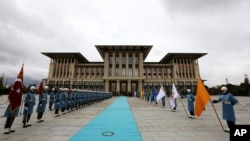When Turkish leader Recep Tayyip Erdoğan opened a $500 million, 1,000-room presidential palace in October, critics compared the grandiose Ankara residence to one being built by former Romanian communist dictator Nicolae Ceaușescu on the eve of his downfall. Commentators asked why Turkish presidents would need such an opulent palace when the office is largely ceremonial, restricted to approving legislation.
In recent weeks, the answer has become increasingly clear. Since switching from the premiership with his August election to the presidency, Erdoğan has been grabbing more powers for himself and forming what opposition commentators claim is a "shadow government." It's part of an effort, they say, to reclaim power over ministers and the country’s parliament that he'd lost when he left the prime minister's office. He'd been prime minister since 2003.
Monitoring or ruling?
Using a confidential decree to sidestep the 1982 constitution, Erdoğan has increased the presidential staff dramatically, boosting the number of directorates from four to 13. New directorates include ones to oversee internal security, foreign relations, economy, defense, energy and investment.
Erdoğan officials say the new units are being formed to help apprise the president of what ministers are doing. Critics argue that a parallel government appears to be developing, part and parcel of a tug they fear toward authoritarianism.
"There are serious concerns that the work of the directorates will go beyond monitoring and become intervention in planning, project formulation and implementation phases," said Fehim Taştekin, host of a political talk show Dogu Divani. "Even today, Erdoğan does not hesitate to intervene in the work of ministers," he wrote on the Al Monitor news site.
Future of Turkish democracy
Claims of an authoritarian bent increased this weekend following the mass arrest of 24 journalists with ties to a one-time Erdogan ally, Islamic cleric Fethullah Gulen. The spiritual leader of the Hizmet movement has been living in self-imposed exile in the United States. The Turkish president has long claimed that Gulen seeks to mount a putsch and is behind allegations of corruption against the government and Erdoğan’s family.
The journalists are being held for plotting to seize power. European leaders have condemned the raids, but Erdoğan publicly told them this week to "mind their own business." In an official statement Monday, Erdoğan said: "We’re pursuing treachery. We’re eliminating stooges. We’re disrupting traps and schemes by the enemies of Turkey."
U.S. officials have expressed concerns over the arrests of the Turkish journalists, including Ekrem Dumanlı, the editor-in-chief of the Zaman daily newspaper.
"We urge the Turkish authorities to conduct investigations quickly, transparently and in a manner consistent with the rule of law," Mark Stroh, White House national security council spokesman, said in a statement.
Changing the rules
The Turkish head of state was previously chosen by parliament, but a 2010 referendum favored by Erdoğan gave Turks a direct vote. Erdoğan was barred by the rules of his Development and Justice Party (AKP) from seeking a fourth term as prime minister and announced during the August presidential election that he wanted to increase the powers of the country’s head of state.
In recent months, the government has introduced sweeping new police powers that limit suspects’ rights and allow preemptive wiretapping. The restrictions include blocking defense attorneys from access to details of legal proceedings brought against their clients during investigations. The new powers reverse restrictions placed on the police passed only 10 months ago to match European Union standards.
The new police and security powers were introduced in the wake of Kurdish protests and riots, mainly in the country's south. Turkish Kurds were protesting Ankara’s refusal to intervene militarily to defend the mainly Syrian Kurdish border town of Kobani from Islamic militants.
Turkey's main opposition party on Tuesday announced plans to launch a legal challenge against the government-sponsored law expanding police powers, arguing it violates civil rights.
Republican People's Party (CHP) spokesman Akif Hamzaçebi said, "We will be taking this legislation, which makes everyone in society a reasonable suspect and puts them in a weak position in front of the judge and prosecutor, to the Constitutional Court."
The new law, enacted Friday, was used this weekend for the police raids on the media organizations.
"There is an attempt to shackle the most fundamental rights and individual freedoms by referring to recent provocations as an excuse," said opposition politician Haluk Koç.
A palatial presidency?
"Erdoğan is apparently determined to impose a new political system on Turkey, replacing the parliamentary order with a state under a powerful president," said analyst Veli Sirin in a paper for the Gatestone Institute, a U.S.-based think tank.
"The constitution authorizes the president to call a cabinet meeting under certain circumstances. Otherwise, the president has no executive authority," he added.
But that isn’t what advisers to Erdoğan believe. Presidential aide Binali Yildirim announced recently that next year Erdoğan plans to chair meetings of the Council of Ministers. It isn’t clear whether those meetings will be held at the palace.




